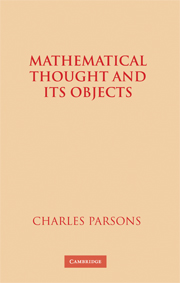3 - Modality and structuralism
Published online by Cambridge University Press: 24 November 2009
Summary
Mathematical modality
In §§11–12 the use of modal notions appeared attractive as a way of formulating eliminative structuralist views of mathematical objects so as to deal with the vacuity problem that such views faced. Before I pursue that idea, I shall consider modal notions more directly in relation to mathematics. Although this provides necessary background for continuing the previous line of argument, it is also of interest in its own right and will be relevant also to other parts of the present work.
Modality is what is expressed primarily by the words ‘necessary’ and ‘possible’ and by the modal auxiliaries ‘can’ and ‘must’. These words have such a variety of uses, some of quite different character, that we could not hope to survey them in a brief compass (and probably to do so at all would be a major linguistic undertaking). However, two distinctions made between uses of modal words or between modalities are of general importance and important for our purposes: (a) that between epistemic and nonepistemic and (b) that between absolute and nonabsolute.
(a) In Naming and Necessity, Kripke stresses the difference between the epistemological notion of the a priori and the notions of necessity and possibility with which he is concerned, which he says belong to metaphysics (pp. 35–36). In this discussion, he does not emphasize the idea of epistemic modalities or epistemic uses of modal words, but of course such can be found.
Information
- Type
- Chapter
- Information
- Mathematical Thought and its Objects , pp. 80 - 116Publisher: Cambridge University PressPrint publication year: 2007
